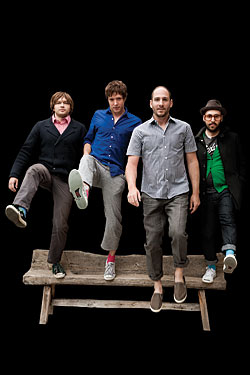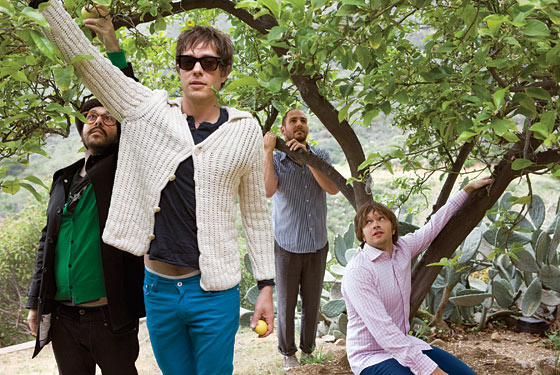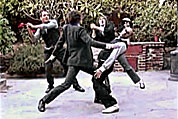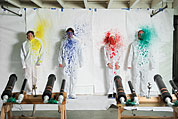
OK Go know they can’t top their just-released, already-legendary “Rube Goldberg video” for kinetic energy. So they’re going to the other extreme. “To my knowledge, this is the first time sleeping has been choreographed,” says front man Damian Kulash, fresh out of his sleeping bag. He and the other three band members are rising and shining in the first morning light that is streaming into L.A.’s Echo Park, where the group is filming a video for their song “End Love” in one elaborate eighteen-hour take that will be sped up to accompany four minutes of music. During the night, the quartet took turns waking up to lip-synch to the song … although moving your mouth at 1/600th the speed of real time is more like stop-motion animation.
An assistant darts in to apply some sunscreen to the now-upright band, whose next task is to stand perfectly still, even as unwitting picnickers frolic in the background of the frame. During this ordeal, a goose has become romantically attached to drummer Dan Konopka, waddling circles around him as he stands in a brightly colored tracksuit, arms outstretched at odd angles. “There’s points where I miss playing the drums,” admits the least performance-art-inclined member of the band. “And sometimes when we’re done recording and done with the tour and we focus on these videos, I kind of find myself being this production assistant. I don’t really have much to do except do the choreography or stand and get blasted in the face with paint, and sometimes I yearn: Man, it would be great to go do a gig. There’s this gulf, like, Holy shit. We’re gonna go jump on treadmills?” Still, he’s willing to run with (or stand still with) each new idea Kulash announces. “I love being a musician first, but making incredibly awesome art projects is a really, really close second.”
If this new video is an exercise in being radically stationary, in real life, it’s the music business that’s operating at a near halt, while OK Go is busily scurrying around on the fringes, trying to find that mythical new paradigm. They’ve come closer than most bands by becoming the undisputed kings of viral music videos. Their “treadmill video” has been viewed more than 50 million times in its official YouTube iteration alone. That seemed unrepeatable, but in just two months, the Rube Goldberg homage has already surpassed 10 million views. If they got paid every time someone watched an OK Go video, maybe they’d be wealthy enough to join the rumored corporate bidding for EMI Music.
Instead, they very publicly announced their divorce from EMI in March, having secured their freedom in order to win back their third album, Of the Blue Colour of the Sky—which Capitol released in January—and immediately rerelease it on their own label, Paracadute (“parachute” in Italian). Capitol reps did not respond to requests for comment, but it’s clear they felt there wasn’t nearly enough monetization to be had from a band whose free online ubiquity hasn’t remotely translated into record sales. (The latest disc has sold 30,000 and faces daunting odds on catching up with the previous album’s 269,000.) A devil’s advocate might reason that if people mostly know OK Go’s “hits” by their generic titles (the “treadmill video,” the “Goldberg video”) and not their actual titles (“Here It Goes Again,” “This Too Shall Pass”), maybe the hooks are strictly visual. Drama Cat is a YouTube superstar, too, but no one’s rushing to invest in his future, right? And if Damian Kulash is the charismatic rock star touted as a next big thing (as he has been for a decade), what kind of career self-sabotage leads him to cede his leading role to a ball dropping onto a lever that crashes a piano?
These questions tend to lose their urgency upon exposure to the charms of Kulash. He’s part classically wiry front-man rocker, part Ivy League brainiac whose idea of bringing sexy back is testifying before the House Judiciary Committee on Internet neutrality. Kulash has been fond of writing New York Times op-ed pieces about major-label shortsightedness; first, he opined about copy protection software, the short-lived practice that penalized the dwindling pool of CD buyers by making discs unrippable. Then, he fired another “warning shot across the bow,” as their manager, Jamie Kitman, puts it, by writing in the Times in February about the ridiculousness of labels’ making YouTube videos un-embeddable (even when the band finances the videos themselves, as OK Go has largely done). “Viral videos that are restrained from going viral” is a self-defeating concept, Kulash reckons. Whether Capitol wearied of taking these public shots or figured it had bigger fish to fry, it agreed to let one of its flagship acts go.

There’s been another ongoing beef, though: with the folks who whisper, like a playground taunt, that maybe a band famous for its videos isn’t much of a band at all. “It never ceases to amaze me that people think that we should feel embarrassed that our videos are successful,” Kulash says over decaf in a Los Feliz, California, bistro, not too scorched from their slo-mo day in the sun. He thinks that such snobbery is a holdover from the days when label chiefs were video auteurs and the art form was defined by MTV instead of DIY. “It seems like a universal that people think the success of a video is at odds with the success of the song musically. I understand that comes from the old model of videos being a distinct advertisement for the song. And when looked at that way, if an advertisement for a car is more powerful than the car itself, yeah, you’ve got a problem. But these things are part and parcel for us and all part of the same art project. I really do wonder how people can so uniformly miss that basic point.” Anyway, he adds, “there has been no a-visual rock since the mid-fifties. What is Elvis without his hips?”
Kulash’s methodology is to come up with the video idea first, then pick the right song to be a soundtrack. That happened with “This Too Shall Pass”; they’d already made one video for that song, featuring the Notre Dame marching band, but didn’t shy away from using it again when the Rube Goldberg idea came up. The video’s series of levers and pulleys have a relentless percussiveness that feels both choreographed and anarchic, graceful yet violent, witty but epic—in other words, like rock and roll. Sixty engineers worked on it, mostly for free, often till two or three in the morning, over a period of five months. And after all that planning and preparation—and two days and 85 takes to get a keeper—it still feels like Jerry Lee Lewis kicking his piano stool or Hendrix lighting his guitar on fire or, sure, Elvis’s pelvis.
Capitol didn’t see it that way. Sources in the OK Go camp say the label told them that because they’d delivered the video a week late, the window of opportunity for promoting the single to radio had passed, and they would have to wait at least until June for another shot. That, more than the controversy over embedding, may have been the last straw for the group. When you can get 10 million sets of eyes and the buzz that comes with it, it’s hard to put that immediate gratification off in favor of the increasingly faint hope that a few modern-rock stations might begrudgingly add a single in response to a promo campaign months down the line.
It wasn’t the first time the label had poured water on some visual scheme or other. “OK Go used to do a dance routine in their set, but it made the label cringe,” says Kitman. “As marketers, they thought that stuff might come off as kind of gay.” When they filmed themselves doing a choreographed dance routine in a backyard for their 2006 breakout video, “A Million Ways,” “the head of digital marketing at Capitol said, ‘If anybody ever sees this video, you’re sunk,’ ” says Kitman. “The band promptly leaked it to a fan, and it was all over the Internet immediately. Within a month, it probably had a million views, and we were getting offers to play in places where we’d never had a record out.” He says the situation reached “this apogee of irony when the EMI digital overlords would come over from England and pick our brains about how to make viral videos for other bands. They’d haul us into label presentations with all the managers and lawyers to talk about EMI’s digital presence. This happened for months, with us sitting quietly, hoping they would eventually do something for OK Go.”
Now that they’re on their own, the band plans to make money the same way they did when they were on a major. “Labels have done a great job of preparing bands for their own demise, because there are almost none that make money off record sales anyway,” says Kulash. “So we’ve learned how to survive without them.”
State Farm sponsored the “This Too Shall Pass” video, so tasteful corporate patronage is an option for video budgets. But licensing and touring will be the bread and butter, as ever—and the videos are effective ads for those revenue streams. “At the end of the day, we’re not going to have trouble making money,” says Kulash. “Ideas are flexible, and not to sound like a neocon, but so is the market. It’s not that hard to find ways to monetize your ideas. It’s very hard to find ways to monetize your CDs when people don’t fucking listen to CDs anymore. Music is how we write our identities; it feels like your emotions explaining themselves to you. That’s the connection that’s hard to make—when you’re just a bunch of kids with guitars trying to get people to listen. Finding inventive ways to do that—that’s the golden egg and the hardest part, not monetizing.”
Also more difficult than making money: maintaining a suitable level of shock and awe. When they play their two sold-out shows at Music Hall of Williamsburg this week, don’t expect to see a dance routine. But you will see something that might be nearly as jarring for a label executive: a song done entirely with handbells. “We want to avoid a predictability where people feel like, Oh, now that’s the part where they switch instruments, ” says Kulash. “We were trying to figure out what makes a viral video, and it really is the same as a live show. I think generally it is some kind of sense of wonder, where you go, Wow! If you want to know our business model, it’s basically: Just keep making awesome shit.”



Watch OK Go’s Videos